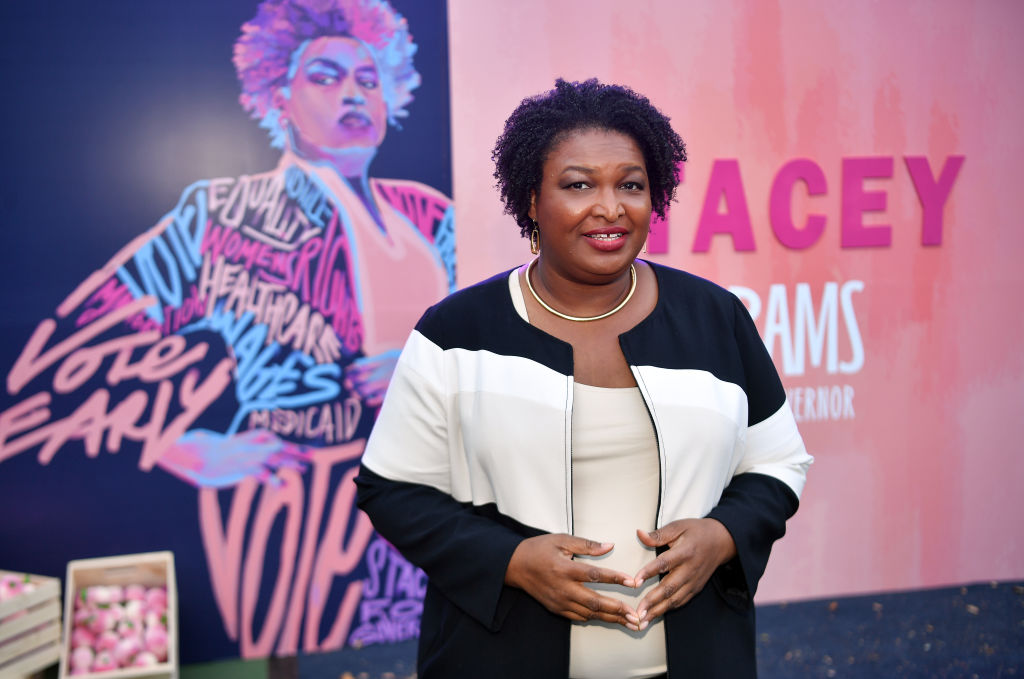That dampness in the air you’ve felt this week isn’t a product of unseasonable fall humidity.
It’s flop sweat being shed by Democrats as they strain to cope with the fact that “Roevember” is canceled.
Some are coping by meeting the new reality head-on and pivoting away from abortion messaging. Nancy Pelosi, for instance, recently addressed the burning topic of inflation by suggesting that Americans suck it up and count their blessings.
John Fetterman, meanwhile, is trying to shore up his dwindling lead in Pennsylvania’s Senate race by doubling down on the one thing his campaign is good at, making goofy memes about Mehmet Oz.
But other Democrats refuse to give up on abortion as the skeleton key that’ll unlock new majorities for the party by leveraging pro-choice angst over the end of Roe v. Wade. Two days ago Joe Biden proclaimed that the first piece of legislation he’ll sign next year if his party controls Congress is a bill codifying Roe, a curious pander at a moment when abortion is losing salience as a top issue. That’s the sort of message you resort to when you’re all out of ideas to address the spiking economic anxiety Americans are feeling from high inflation.
Almost out of ideas, I should say. You can always squander a few million barrels of oil from the Strategic Petroleum Reserve to bribe voters with a brief dip in gas prices before the midterms.
Like Biden, Stacey Abrams is also clinging to abortion as a secret weapon to galvanize turnout next month. During an interview yesterday on MSNBC, host Mike Barnicle teed her up to speak directly to voters’ concerns about the economy. This was her chance to meet the electorate where it is and show them that their priorities are her priorities. Abrams responded by … talking about abortion.
And not doing a very good job of it. “Having children is why you’re worried about your price for gas, it’s why you’re concerned about how much food costs,” she told Barnicle. “You can’t divorce being forced to carry an unwanted pregnancy from the economic realities of having a child.”
“Stacey Abrams suggests having an abortion as solution to inflation,” read Fox News’ headline about her answer, summarizing the reaction of many pro-lifers on Twitter. Zaid Jilani observed that it was a “strange way to campaign” in a state that’s more religious than most.
Watching that clip in light of the polls of Georgia’s gubernatorial race brought to mind a question I’ve asked myself occasionally, and which many more of us are likely to be asking three weeks from now.
Is Stacey Abrams overrated?
Maybe she isn’t.
Chew on this and marvel: Abrams is one of the biggest stars in the Democratic Party despite having never held federal or statewide office. She came within a whisker of being governor of Georgia in 2018, a victory that might have propelled her to becoming Joe Biden’s running mate, but fell just short. The highest office she’s held is minority leader of the Georgia House of Representatives. Most of us, me included, would struggle to name a single state legislator from either party in any of the 50 states. (I know Rusty Bowers because of the January 6 saga but draw a blank beyond that.) Abrams is somehow a household name, at least on her side of the aisle.
It’s surpassingly rare for a non-celebrity politician to build a national profile without having held major office anywhere. Typically the only way to do it is to run for president, a la Pete Buttigieg, but thus far Abrams has opted against doing that. If you view politics as a competition among ambitious strivers to promote themselves, you can make a case that not only isn’t she overrated, she’s a downright prodigy. No one has done more with less in terms of credentials to make themselves a national power player.
But Abrams has more than that going for her. Since losing her race for governor she’s devoted herself to voting rights, becoming arguably the most prominent activist on that issue in the United States. Voting rights is a subject with special power among Democratic voters, especially and understandably African Americans who live in states where Jim Crow was practiced. But non-black liberals also view voting access as a matter of urgent concern in 2022, partly because of the structural advantage Republicans presently enjoy in national elections and partly because of the number of Trump-backed election deniers poised to win key races in swing states.
Abrams has owned the issue in recent years, making her not just a star politician but a sort of civil rights leader. And in the process she’s built a fearsome turnout organization in Georgia, widely credited as the difference-maker in Democrats’ shocking performance there in 2020. Buttigieg’s claim to party stardom is that he (sort of, maybe) won the Iowa caucuses two years ago. Abrams’ claim is that she helped deliver Georgia to Biden and then, for good measure, delivered two Senate seats to her party in the state’s runoffs.
If not for Abrams’ group helping Jon Ossoff and Raphael Warnock to victory, the entire Democratic agenda in Biden’s first two years as president would have been impossible. That’s a pretty good credential for a Democratic up-and-comer.
As for her polling against Brian Kemp in this year’s race, there’s no denying that she’s in trouble. She hasn’t led a single poll.
But there’s also no denying that Kemp is an unusually strong opponent, enough so to have obliterated Donald Trump’s handpicked challenger in a Republican primary. He’s an incumbent, he has a good governing record, and he’s running in a national environment that solidly favors the GOP. Abrams losing to him again doesn’t mean she’s overrated, it means she’s not a miracle worker. If you think some other candidate would have performed better against Kemp, I’m sure the Democrats are all ears.
Finally, to say that Abrams is overrated is to raise the question, “Overrated relative to whom?” Her party has no bench! Kamala Harris is a disastrous retail politician. Buttigieg’s 2020 track record suggests he’s incapable of winning black votes. Gavin Newsom presides over a state viewed by most of the country as dystopian. Jared Polis has zero name recognition and, like Buttigieg, would need to make the country comfortable with electing a gay man as president. Amy Klobuchar is Amy Klobuchar.
If you’re a progressive scanning a political wasteland like that, go figure that you might sigh and settle on Stacey Abrams as your savior.
The thing about saviors, though, is that at some point they have to actually save you.
The last time Abrams won an election was 2016—when she ran unopposed.
If she had lost badly to Kemp in 2018 and were performing better this year, we could point to that and call it progress at least. She might not be over the hump yet, one might say, but she’s looking good for a third try in 2026, when Kemp will be term-limited. Even better would be if Raphael Warnock, the other Democrat on this year’s ballot, were underperforming Abrams in his Senate race. That would be evidence that she’s still a strong candidate relative to the rest of her party.
In reality, Warnock leads Herschel Walker by 2.4 points as of yesterday. He’s taking 47.6 percent of the vote, more than two points better than Abrams against Kemp. And Abrams isn’t doing better this year than she did in 2018. She’s doing worse. She pulled 48.8 percent in that election, more than 3 points higher than her take in the current polling average. She’s lost ground.
Comparing 2018 to 2022 is dubious, admittedly. Kemp and Warnock are now each running as incumbents, with all the advantages attending thereto. The national environment in 2018 favored Democrats while the national environment this year favors Republicans. And Abrams’ Republican opponent is several orders of magnitude greater than Warnock’s in metrics of raw political skill.
Still, we don’t typically call candidates who’ve lost multiple consecutive statewide elections “rising stars.” To be a rising star, you have to … rise. Until she proves she’s meaningfully more competitive electorally than a replacement-level Democrat, she isn’t one.
Her electoral acumen is questionable too. After losing the gubernatorial race in 2018, the stars seemed to be aligning for an Abrams Senate run. Donald Trump’s party had just been shellacked in that year’s House races; Trump himself was chronically unpopular despite the roaring economy, portending another bad cycle for the right; and Sen. David Perdue, whose seat was up in the next cycle, was hardly some charismatic world-beater. Abrams might have surveyed the landscape and calculated that 2020 would be a good year for her party. That was her chance to jump into the Senate race and trust that Democratic voters would rally to avenge her narrow defeat to Kemp by sending her to Washington.
Instead, for reasons that elude me, she passed. Maybe she had her heart set on being governor (never mind that the country hasn’t elected a governor president in more than 20 years). Or maybe she gambled that Trump would win reelection and therefore the 2022 cycle would be another Democratic wave in the making, favoring her second gubernatorial bid. Whatever the reason, Ossoff’s and Warnock’s victories in last year’s runoffs suggest Abrams would be a sitting senator now if she had had a better sense of the political currents.
But the core reason she’s overrated is that she often has a tin ear on messaging, allowing her progressive instincts to get the better of her despite the fact that she’s running in a traditionally Republican toss-up state. Yesterday’s cringy musing on abortion as a solution to the rising cost of child care is just the latest example. There was this notorious photo earlier this year, which made the rounds among conservatives who were furious about schoolchildren being made to bear the brunt of COVID precautions.
Another example of her tin ear: her pronouncements on voter ID.
Abrams’ views are more complicated than a short, heavily edited clip from the RNC would have you believe, of course. But it’s political malpractice for her to have placed herself on the wrong side of the issue in any context given how phenomenally well it polls with voters. In July Gallup found that 79 percent of adults support requiring photo identification to vote; six years ago, before she ran for governor, 80 percent said so. Among independents, support stands at 84 percent. Even a majority of Democrats are in favor.
If you build your political brand on improving America’s elections, embracing a position that eight out of 10 people associate with voter fraud seems not so shrewd. Particularly considering that state voter ID requirements don’t actually deter people from voting.
She’s been irresponsible too about Georgia’s 2021 election law, once calling it “a redux of Jim Crow in a suit and tie.” When turnout for early voting under the new law in this year’s primaries went up, Abrams took to arguing, counterintuitively, that “increased turnout has nothing to do with [voter] suppression.” Fast forward to Tuesday, when Georgia’s secretary of state reported that early voting in the general election this year has smashed records, exceeding turnout at the same point in 2018 by 85 percent. Led by Abrams, Democrats spent weeks during the spring of 2021 demagoging the new law as some singular assault on democracy, ultimately leading Major League Baseball to move its All-Star Game from Atlanta in protest.
If Georgia ends up seeing record midterm turnout in 2022, as seems likely, there’s no way her credibility won’t be damaged. However progressives might like to pretend otherwise.
Abrams’ biggest liability, though, and the crux of the case that she’s overrated as a politician, is her embarrassing claim that the 2018 gubernatorial election was “stolen” from her.
Not stolen in the Trumpian sense, mind you, involving tampering with voting machines or “mules” flooding drop boxes. Abrams’ version of The Big Lie (“The Little Lie”?) is that Democratic voters were purged from Georgia’s registration rolls in inexplicable numbers due to chicanery by Brian Kemp and the Georgia GOP. It’s nonsense, as David French explained at length earlier this week.
But it also turned Stacey Abrams into a star. The story of a black woman in the Deep South being robbed of justice at the polls by the right wing was far too seductive for Democrats to disclaim. The party depends heavily on black and women voters, and suddenly here was a member of that demographic whom it could make into a martyr in hopes of rallying its base. The myth of the stolen election became a sort of origin story for Abrams, making her not just the party’s foremost voting-rights activist but also the foremost victim of our supposedly corrupt extant regime.
Democrats rewarded her election denialism by tapping her to deliver the rebuttal to Trump’s State of the Union address in February 2019. Liberals swooned over her, fantasizing about a world where a politician like Abrams might reach the highest heights. Insisting that she had been cheated quickly became party orthodoxy, even a way for Democratic presidential candidates to buy credibility with progressives and African-American voters on the cheap in 2020.
Ultimately, I think The Little Lie accomplished for Abrams what The Big Lie accomplished for Trump, convincing true believers within their respective parties that each is more formidable electorally than they really are. If Trump was cheated in 2020 then the GOP doesn’t need a more electable nominee in 2024, it just needs a better fraud-detection operation. If Abrams was cheated in 2018 then Democrats should consider her a de facto national figure, a rising star in the party who’s viable for the vice presidency. She’s the duly elected governor of Georgia, isn’t she?
Cheering her on as she promoted her election lies was inexcusable even before January 6. Doing so after January 6 almost amounts to self-sabotage by Democrats, handing Trump apologists an easy rejoinder whenever they’re reminded that their party is led by a sore-loser election crank. It’s of a piece with Democratic outfits running ads in GOP primaries this year to promote insurrectionist candidates while solemnly denouncing the right’s authoritarian drift in their own ads. Either you care about defending the integrity of American elections or you don’t.
In the end, I wonder if Abrams’ baggage—her progressivism and, above all, her sore-loserdom—makes her a liability for her party in Georgia on balance. Probably not: Her name recognition coupled with her organizational know-how must mean she’ll do better against Kemp than the average Democratic wannabe in the state would. There are reasons to believe otherwise, though. Abrams might end up galvanizing right-wing turnout more than the average Democrat would, and might even have been a quiet boon to Kemp in his primary against Trump-backed David Perdue. If Republican primary voters had known at the time that they would face a garden-variety Dem in the general election, they might have felt more comfortable rolling the dice on Perdue. But with a candidate as left-wing and disliked as Stacey Abrams looming, undecided righties may have felt obliged to play their strongest hand. That meant sticking with the incumbent.
And it likely means doom for Abrams in three weeks.
Oh well. At least she can be president of Star Trek.







Please note that we at The Dispatch hold ourselves, our work, and our commenters to a higher standard than other places on the internet. We welcome comments that foster genuine debate or discussion—including comments critical of us or our work—but responses that include ad hominem attacks on fellow Dispatch members or are intended to stoke fear and anger may be moderated.
With your membership, you only have the ability to comment on The Morning Dispatch articles. Consider upgrading to join the conversation everywhere.